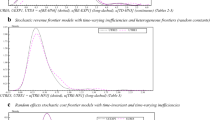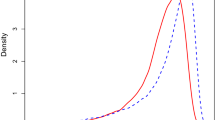Abstract
The study of productive efficiency has not been a traditional field of research in fisheries economics. However, recent papers have dealt with testing what it is known as “the good captain hypothesis”, according to which differences in catches among vessels can be explained in terms of skipper skill (efficiency). These papers introduce an interesting research issue: the distinction between luck and efficiency. In this paper, we try to shed more light on this topic using a panel data set on the hake fishery in Northern Spain. In particular, we are interested in separating efficiency not only from luck but also from other time invariant variables, such as vessel characteristics, which sometimes are confounded with efficiency. In contrast to the other papers that deal with this topic, we find that luck is more important than technical efficiency in explaining catches. We argue this can be explained by the fact that other papers use data at a higher level of temporal aggregation. Over longer periods of time, skill persists while luck averages away.
Similar content being viewed by others
Notes
Netters lay the nets and return to port. The next day they lift the nets, harvest the fish, and lay the nets again on the same ground or on a different one. Longliners leave port earlier and cast the line with live bait, wait for several hours and lift the line before returning to port.
During 1999 fishing season 30 other species were caught.
Some fishing grounds are also closed during spawning season due to local regulations.
All boats carry the maximal length of nets or lines allowed, so there is no further variation in this input.
The estimations were carried out using LIMDEP Version 8.0 (Greene 2002).
The interpretation of the coefficient of a dummy variable, say γ, when the dependent variable is in logs is (eγ − 1). (see Suits 1983).
Any non-zero but constant mean is simply absorbed by the intercept α.
Previous studies (e.g., Squires and Kirkley 1999) have also found no correlation between the individual effects and the inputs.
An important detail is that, we need to distinguish the variance of u i , which we call σ 2 u , from γ2, which can be thought of as the variance of the normal that is converted into u i by taking the absolute value (or, equivalently, by truncating at zero). In the stochastic frontier literature the notation σ 2 u is often used for what we call γ2. The relationship between the two is that σ 2 u = γ2(π − 2)/π. Since (π − 2)/π is about 0.36, this is not a minor distinction. What we report as σ 2 u is our estimate of the variance of u i , which is comparable to what we have reported for the other models in Tables 3 and 4.
References
Aigner DJ, Lovell CAK, Schmidt PJ (1977) Formulation and estimation of stochastic frontier production function models. J Economet 6:21–37
Balestra P, Nerlove M (1966) Pooling cross-section and time series data in the estimation of a dynamic model: the demand for natural gas. Econometrica 34: 387–399
Battese GE, Coelli TJ (1995) A model for technical inefficiency effects in a stochastic frontier production function for panel data. Empir Econ 20:325–332
Battese GE, Coelli TJ (1988) Prediction of firm-level technical efficiencies with a generalized frontier production function and panel data. J Economet 38:387–399
Eggert H, Tveterås R (2004) Stochastic production and heterogeneous risk preferences: commercial fishers’ gear choices. Am J Agr Econ 86(1):199–212
Farrell MJ (1957) The measurement of productive efficiency. J Roy Stat Soc Ser A 120(3): 253–290
Grafton RQ, Squires D, Fox KJ (2000) Private property and economic efficiency: a study of a common-pool resource. J. Law Econ 43(2):679–713
Greene WH (2002) LIMDEP version 8.0 user’s manual. Econometric Software Inc, New York
Hannesson R (1983) Bioeconomic production function in fisheries: theoretical and empirical analysis. Can J Fish Aquat Sci 40:968–982
Hausman JA (1978) Specification tests in econometrics. Econometrica 46:1251–1272
Hausman JA, Taylor WE (1981) Panel data and unobservable effects. Econometrica 49(6):1377–1398
Just RE, Pope RD (1978) Stochastic specification of production functions and economic implications. J Econometr 7:67–86
Kirkley JE, Squires D, Strand IE (1995) Assessing technical efficiency in commercial fisheries: the mid-atlantic sea scallop fishery. Am J Agr Econ 77(4):686–697
Kirkley JE, Squires D, Strand IE (1998) Characterizing managerial skill and technical efficiency in a fishery. J Prod Anal 9:145–160
Pitt M, Lee LF (1981) The measurement and sources of technical inefficiency in the Indonesian weaving industry. J Dev Econ 9:43–64
Salvanes, KG, Steen F (1994) Testing for relative performance between seasons in a fishery. Land Econ 70(4):431–447
Schmidt P, Sickles RC (1984) Production frontiers and panel data. J Bus Econ Stat 2:367–374
Squires D, Kirkley J (1999) Skipper skill and panel data in fishing industries. Can J Fish Aquat Sci 56(11): 2011–2018
Suits D (1983) Dummy variables: mechanics versus interpretation. Rev Econ Stat 66: 177–180
Woolridge JM (2002) Econometric analysis of cross section and panel data. MIT Press Cambridge, MA
Author information
Authors and Affiliations
Corresponding author
Rights and permissions
About this article
Cite this article
Alvarez, A., Schmidt, P. Is skill more important than luck in explaining fish catches?. J Prod Anal 26, 15–25 (2006). https://doi.org/10.1007/s11123-006-0002-x
Published:
Issue Date:
DOI: https://doi.org/10.1007/s11123-006-0002-x




